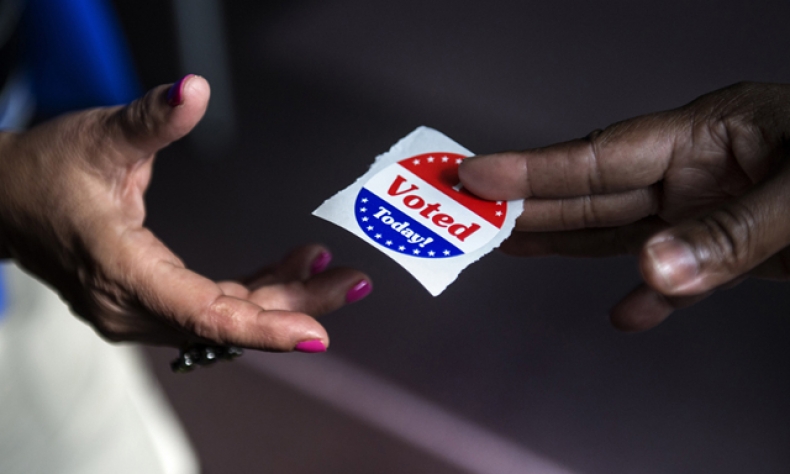Divided Democratic Party Spells Trouble for Both Biden and Sanders

There is a strong possibility that as neither Biden nor Sanders can unite their party’s supporters overall, it could in fact deliver their worst-case scenario and hand the current president another four years in office.
The Democratic Party nomination became effectively a two-horse race on Super-Tuesday as former vice president Joe Biden and Senator Bernie Sanders took a commanding lead amongst the chasing pack.
Biden’s campaign, which seemed dead before victory in South Carolina on February 29, continued its recent momentum by claiming victory in ten out of fourteen states, including six in the South, and ended the night with a projected total of 627 delegates, according to Associated Press (AP).
Sanders enjoyed an equally impressive night, recording victory in four states, including a projected sizable lead in the all-important state of California, which carries 415 delegates, taking his total to 551.
For billionaire Michael Bloomberg and Senator Elizabeth Warren, their disappointing performances have already had enormous ramifications on their campaign futures. Despite spending a reported US$500 million on his campaign, billionaire Bloomberg’s run to the White House has already ended, announcing on Wednesday that will pull out of the contest and endorse Biden.
Similar actions have taken place in the Warren camp, who announced on Thursday that she was also pulling out of the race after failing to record a single primary victory, including in her home state of Massachusetts where she finished third. She, unlike Bloomberg, has yet to announce who she will endorse, saying she needed to take some time to make her decision.
With Bloomberg and Warren now out of the running, there is now two distinct fractions in the Democratic party—those who back Biden’s brand of centralised, Obama-era politics, and Sanders more democratic socialist policies.
African Americans & Centralists for Biden
From the polling results after Tuesday’s primaries, it’s clear to see that both Biden and Sanders are drawing support from almost opposite ends in their contrasting demographics.
The Former vice president scored well with African Americans, older people and those looking to return to the Obama years. Biden performed well in Southern states, taking all six, particularly with African American voters, who in Virginia, North Carolina and Alabama voted for him six out of ten compared to Sanders, according to AP.
He also performed well in important states such as Texas, which is key not only for its high number of delegates but also for the many demographics represented in it. His win in Minnesota also demonstrated that his reach can extend beyond the South.
Biden was also seen as most likely to unite the Democratic Party, especially in both Virginia and North Carolina, where he won almost two-thirds of their support compared to Sanders, according to AP. He received similarly high numbers for old and moderate voters, who preferred him over Sanders, as did potential swing voters, with Virginia, seen as a key battle ground come November, showing around 40 percent of voters who said they voted in the 2016 Republican primary preferring him over Sanders.
Sanders takes the young and Hispanic vote
In contrast, Sanders appealed greatly to young, Latino and very liberal voters, as seen by his projected sizeable win in California.
In the southwestern state, where Latino’s make up 30 percent of the vote, Sanders scored roughly half that figure, double on what Biden managed to achieve, according to the AP poll. Given they will make up the largest non-white voting bloc in the 2020 presidential election, overtaking Black voters for the first time according to a Pew Research report, and have a strong dislike for Trump’s anti-immigration rhetoric, securing their vote will be of utmost importance.
Sanders also performed exceptionally well with younger voters. In California and Colorado, Sanders won approx. 60 percent of the under 30 votes, and in Vermont he won more than 7 in 10 young voters. He also performed well with very liberal voters, gaining votes by a nearly 3-to-1 margin over Biden in California. He continued to pick up the majority of very liberal voters in Vermont, scoring 7 in 10 voters, and outscored Biden on the very liberal vote in Colorado, Virginia and North Carolina respectively.
Nomination battle set to wrangle on
With both Biden and Sanders running virtually neck-and-neck after Tuesday’s primaries, it appears the nomination to run against Donald Trump is expected to continue, potentially all the way to the national convention in June.
This is far from ideal for a number of officials within the party, who would prefer to settle on one candidate to unite behind before the convention starts as worry’s mount that the mudslinging witnessed in the 2016 nomination may derail the Democratic Party’s bid in November.
For some, the protracted battle between Hilary Clinton and Sanders, which Clinton belatedly won, severely tarnished her and the parties image going into the election. Speaking on the Howard Stern Show in December, Clinton said she still felt “hurt” that Sanders did not endorse her immediately after his campaign ended, with the Vermont Senator waiting a full month before endorsing her fully.
When asked by Stern if he could have endorsed her sooner, Clinton replied: “He could have. He hurt me, there’s no doubt about it.” It follows similar comments she made against Sanders in her 2017 memoir about her failed presidential bid, saying his attacks against her did “lasting damage” in the general election.
Republican’s working on Donald Trump’s re-election campaign have already highlighted a protracted fight between Biden and Sanders as a positive for their campaign, with Trump’s campaign manager Brad Parscale saying it is “good for Republicans on net”.
“The results only increase the likelihood that no candidate will have enough delegates for a first ballot victory at their convention, which only means more chaos!” Parscale said in a statement.
Trump himself has been keen to talk up a potential rift between the two, tweeting during the primary “The Democrat establishment came together and crushed Bernie Sanders, AGAIN!” It is thought Trump and his team believe they have a better chance of defeating Sanders rather than Biden, as they may be able to attract Democrat voters who harbour concerns over the senator’s democratic socialist policies.
Signs look ominous however that either Biden or Sanders can unite both fractions within their party. Both represent almost opposing views on a number of key issues including healthcare and foreign policy and as the polls show, neither is taking support away from their opponent.
Both teams have also already taken to political point scoring against each other as they look to keep momentum in the run up to primaries in Idaho, Michigan, Mississippi, Missouri, and Washington on March 10.
At a news conference in Vermont on Wednesday, Sanders lashed out the establishment within his party, accusing them of trying to supress his march forward by backing Biden, showcasing a more aggressive approach which some like Roseann DeMoro, a key Sanders ally and a former president of National Nurses United, had demanded.
Division could hand Trump victory
With both sides now unlikely to pull out unless they receive a disastrous set of results next week and currently unable to attract the necessary votes from the others support base, it seems less and less likely that one candidate will win the 1,991 delegates needed for an out-right majority and the Democratic Party nomination.
FiveThirtyEight, a website that analyses polling, forecasts that neither Biden nor Sanders will likely have a majority by June, which could lead to a contested convention where the Democratic establishment would have the overall say on who wins, almost certainly handing Biden the nomination given their favouritism for him.
This would not sit well with Sanders’ supporters, who at least half of in North Carolina and the majority in California, Colorado, Massachusetts, Texas and Virginia have said they would be unhappy to back Biden as their nominee, according to the AP. This would spell trouble for Biden, who needs Sanders’ Latino and under 30’s voters if he is to have a chance of toppling Trump and becoming the next president of the United States.
Democrats have stated all along that they are united in their bid to ensure Donald Trump does not win a second term in office. But there is a strong possibility that as neither Biden nor Sanders can unite their party’s supporters overall, it could in fact deliver their worst-case scenario and hand the current president another four years in office.
 Facebook
Facebook
 Twitter
Twitter
 Linkedin
Linkedin
 Google +
Google +







